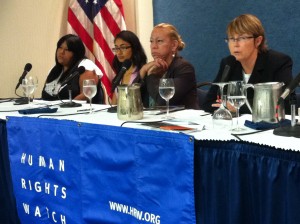“What’s the difference between a junkie and a sex worker?”
That’s the question human rights advocates rose Thursday as they presented their report: “Sex Workers at Risk”. The conclusion: The government will help drug addicts avoid HIV, even though what they are doing is illegal: But, as of now, the government can punish sex workers for protecting themselves from the same disease.

(From left to right) Ruby Corado, Sonia Rastogi, Bamby Salcedo and Megan McLemore discuss the findings of the “Sex Workers at Risk” report Thursday at the National Press Club in Washington.
In partnership with Human Rights Watch, several activists and human rights workers testified to what they call a pervasive and life-threatening law enforcement practice: Using condoms as evidence of intent to engage in prostitution.
This policy, according to Megan McLemore, a senior researcher at Human Rights Watch, is forcing sex workers to expose themselves to deadly sexually transmitted diseases for fear of being arrested.
“Every person, including sex workers, has a right to life,” McLemore said Thursday. “Standing on a corner, they do not have a lot of protection from harm… Condoms should simply be off-limits as a tool for law enforcement.”
The study focuses on four U.S. cities where consistent reports of the policy have been made.
“Police in New York, Los Angeles, Washington, D.C. and San Francisco are confiscating condoms from sex workers and transgender women, undermining health department campaigns to reduce HIV,” Human Rights Watch said in a release.
In one case, New York City police were confiscating the same “NYC” condoms that the city’s Dept. of Health and Mental Hygiene distributes to battle the spread of HIV infection.
But this problem is not unique to those four cities.
“This is a global problem that’s been well-documented,” McLemore said.
Andrea Ritchie, a police misconduct attorney and organizer in New York City, said the problem is primarily a public health issue. She said the policy equals either a jail sentence or a death sentence for the people who engage in “survival sex work.”
She spoke of a 22-year-old black transgendered woman who said, “I’m damned if I do and damned if I don’t. Why do they take our condoms? Do they want us to die?”
The racial and sexual identity of the sex workers involved is a key point in the advocacy group’s research.
“In more than 685,000 stops conducted by the NYPD last year, 90 percent targeted black and Latina New Yorkers,” Ritchie said. “They are also disproportionately homeless.”
While completing research for the study, McLemore traveled around with HIPS–Helping Individual Prostitutes Survive. The organization, based in Washington, sends a van around the city on weekend nights distributing condoms and safe sex information, exchanging clean syringes for used ones and offering free HIV testing and counseling.
During one of these trips, she witnessed a number of sex workers who refused to take more than two condoms, because they had previously been harassed. But the number of condoms they are “allowed” to carry has never been established.
“The word on the street is usually that two or three are allowed,” McLemore said. “This is an urban myth based on the fact that police are interfering with the ability for people to carry as many as they wish… There certainly isn’t a law that limits the number of condoms one can carry.”
Because there is no written law that prohibits the use of condoms as evidence, there is also no benchmark that establishes how many or how few condoms can be considered intent to prostitute. That means the possession of even one condom can be considered evidence, according to Ritchie.
The condom is usually combined with other evidence that the panelists said should also be considered illegal. Police reports studied by Human Rights Watch revealed reasons for arrest are often combinations of an alleged sex worker’s clothes, amount of cash and location where the arrest occurred. In New York, arrest sheets revealed just one condom is considered “sexual paraphernalia”.
“This doesn’t only apply to sex workers. If you go to a club, and you intend to maybe meet someone… Having more than two condoms (the fictional number believed to be allowed in D.C.) will put you in the same situation as somebody on the street,” said Ruby Corado, a DC activist and community organizer.
The only permissible reason to arrest a sex worker, Ritchie said, is when there is “An agreement into enter into sexual services for money. That’s the law.”
Going forward, the advocates hope the practice of considering condoms evidence will be made expressly illegal. The panelists said the government, in the interest of public health, should treat sex workers the same way it treats addicts of illegal drugs—who can receive clean needles in order to avoid infection.
“The progress that has been made (for drug users)… Has been done by advocacy, groups, criminal and civil lawyers, and it has taken years,” Ritchie said. “It’s not as if drug use is somehow favored by police. It’s that there’s been activism. I think the same kind of activism is happening with sex workers.”
Advocates of banning the condom policy will be spreading awareness at the upcoming International AIDS Conference in Washington, from July 22 to 27.
